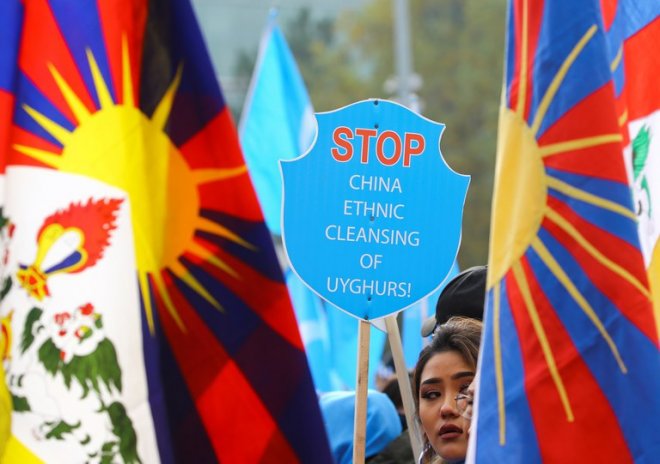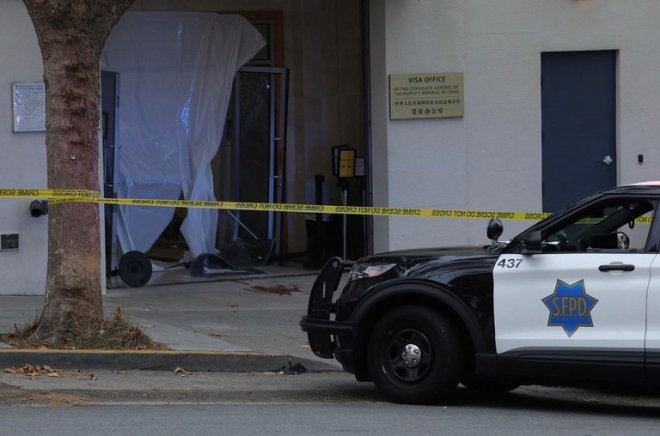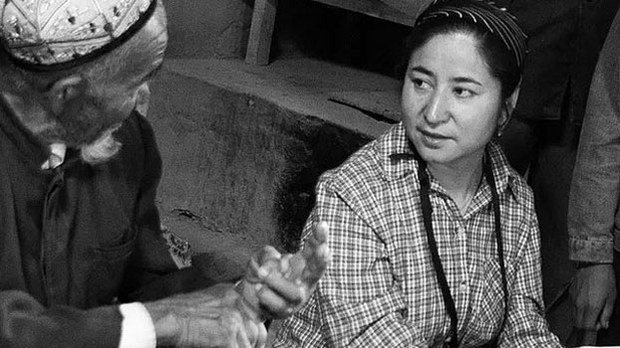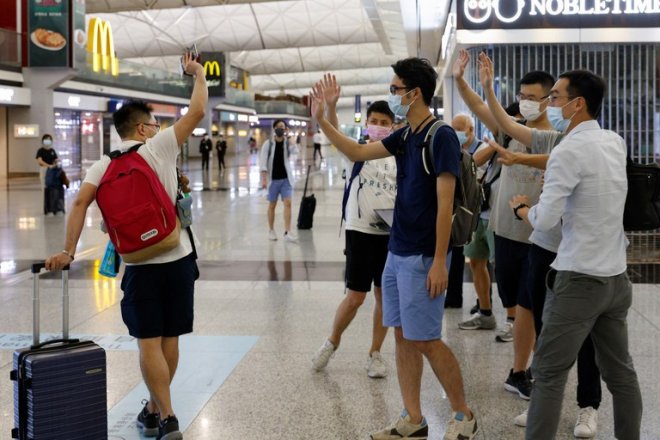Overseas activists call for Xi Jinping's resignation, warn of crackdown on protests
Rights activists and democracy campaigners outside China have come out in strong support of the "white paper" protest movement last weekend that was sparked by a fire in a locked-down apartment building in Xinjiang"s regional capital, Urumqi.
The Nov. 24 fire left 10 dead and sparked protests across China over the weekend after video of the blaze went viral, with many people expressing condolences for the victims and calling for an end to ruling Chinese Communist Party leader Xi Jinping"s zero-COVID policy of strict lockdowns, compulsory COVID-19 testing and mass tracking and surveillance via the Health Code smartphone app.
Some protesters picked up slogans from the "Bridge Man" protest banners hung from a traffic bridge in Beijing on Oct. 13 that called on Xi to step down and call elections, as well as an end to lockdowns and mass COVID-10 testing and surveillance.
Those calls were echoed in an open letter to the Chinese government by dozens of exiled Chinese dissidents including Wang Juntao in response to the protests, in which participants held up blank sheets of paper in a mute and ironic protest against authoritarian rule and lack of freedom of speech.
"There are angry public protests all across China right now, demanding an end to the zero-COVID policy ... which disregards people"s suffering and flies in the face of medical consensus," the letter said.
"As the person responsible for it, Xi Jinping should step down!"
The letter called for a full review of COVID-19 measures, research into an effective vaccination and treatment program, and an end to rolling lockdowns across the country.
"[China should] investigate Xi Jinping"s cover-up of the early stages of the pandemic ... and hold him accountable for wrongdoing, along with the Communist Party and government officials ... who enforced his tyrannical laws," the letter said.
Thinking twice about harsh crackdowns
Former 1989 student leader Wang Dan, who runs the Taiwan-based Dialogue China think tank, said overseas solidarity was very important to make the most of the weekend"s protests, which were mostly spontaneous and uncoordinated.
He said the more overseas activists speak out in support of the movement, the more the authorities are likely to think twice about a harsh crackdown on protesters.
![]() In this June 3, 2016, photo, Wang Dan, former student leader who participated in demonstrations during 1989 Tiananmen Square in Beijing speaks during a press event at Foreign Correspondents" Club of Japan in Tokyo. (Shuji Kajiyama/AP)
In this June 3, 2016, photo, Wang Dan, former student leader who participated in demonstrations during 1989 Tiananmen Square in Beijing speaks during a press event at Foreign Correspondents" Club of Japan in Tokyo. (Shuji Kajiyama/AP)
"Solidarity from the whole world, including Taiwan, is very important to the safety of the protesters in China," Wang told a news conference on the protests in Taipei on Tuesday. "Taiwan, which wants to join the camp of free and democratic nations, should also express its concerns."
"It"s a concrete manifestation of resistance to the Chinese Communist Party and of the protection of Taiwan," he said, in a reference to Beijing"s threat of armed invasion to force "unification" on democratic Taiwan, which has never been ruled by the Chinese Communist Party nor formed part of the 73-year-old People"s Republic of China.
Denting Xi’s prestige?
Wang said the protests had likely already hurt Xi"s prestige within the party.
"This is just the beginning," he said, citing rising youth unemployment and an economic downturn that will fuel dissatisfaction with the Chinese government. "[Xi] definitely won"t have an easy time over the next five years, and I strongly doubt he will get a fourth term in office."
Wang also co-signed a second open letter calling on the army not to fire on civilians, should the protests spread, along with dozens of other overseas activists including U.S.-based 1979 Democracy Wall movement leader Wei Jingsheng, legal scholar and activist Teng Biao and former 1989 student leader Zhou Fengsuo, who heads the rights group Humanitarian China.
"We cannot have a repeat of the tragedy of the June 4, 1989 massacre," according to the letter, addressed to the People"s Liberation Army.
"At a time of surging protests against the brutal zero-COVID policy, we ... feel very strongly that the Chinese Communist Party, especially the dictator Xi Jinping, may mobilize all of the repressive machinery at his disposal to maintain his personal and autocratic rule," it said.
"No matter what happens ... you must never again drive tanks to Tiananmen Square like you did in 1989, let alone shoot at citizens and students in another massacre," the letter said.
It called on Chinese citizens to record any actions by the army or police leading to citizens being harmed, before echoing the first letter"s call for Xi to step down.
Support from Taiwan
Taiwanese lawmaker Hung Shen-han of the ruling Democratic Progressive Party agreed, saying the aspirations of many of Taiwan"s 23 million people were in alignment with the "white paper" protests.
"The more people see clearly the true nature of the Chinese Communist Party, how it doesn"t hesitate to crush people"s freedoms and livelihoods, the more empowered those who fight together for freedom will be," he told the news conference.
"As more and more people start to understand, we won"t need to be hostile. We can be friends, support each other, and pursue freedom and democracy [together]," Hung said.
Meanwhile, an exiled Hong Konger who gave only the nickname Sky said he empathized with the movement, although he noted that Hong Kongers" fight to preserve their traditional freedoms in 2019 had garnered scant sympathy from most residents of mainland China at the time.
"As a Hong Konger and as a human being, I support the white paper revolution, because the freedom to express one"s dissatisfaction, thoughts and ideas should be my birthright, and it"s a value that we believe in," he told the news conference.
"Maybe one day, with mutual understanding and respect, we can become partners in the pursuit of democracy," he said.
Lawyer Ho Chao-tung, who heads Taiwan"s East Turkestan Association, said the fire only came to the attention of students on Chinese university campuses after Uyghurs surrounded government offices in Urumqi to protest at the lockdown, which they said left the apartment building residents unable to escape the blaze.
The local authorities denied that the victims had been unable to leave. But there are precedents for locked doors and blocked exits leading to fire deaths in mainland China.
Translated and edited by Luisetta Mudie. Edited by Malcolm Foster.
[圖擷取自網路,如有疑問請私訊]
The Nov. 24 fire left 10 dead and sparked protests across China over the weekend after video of the blaze went viral, with many people expressing condolences for the victims and calling for an end to ruling Chinese Communist Party leader Xi Jinping"s zero-COVID policy of strict lockdowns, compulsory COVID-19 testing and mass tracking and surveillance via the Health Code smartphone app.
Some protesters picked up slogans from the "Bridge Man" protest banners hung from a traffic bridge in Beijing on Oct. 13 that called on Xi to step down and call elections, as well as an end to lockdowns and mass COVID-10 testing and surveillance.
Those calls were echoed in an open letter to the Chinese government by dozens of exiled Chinese dissidents including Wang Juntao in response to the protests, in which participants held up blank sheets of paper in a mute and ironic protest against authoritarian rule and lack of freedom of speech.
"There are angry public protests all across China right now, demanding an end to the zero-COVID policy ... which disregards people"s suffering and flies in the face of medical consensus," the letter said.
"As the person responsible for it, Xi Jinping should step down!"
The letter called for a full review of COVID-19 measures, research into an effective vaccination and treatment program, and an end to rolling lockdowns across the country.
"[China should] investigate Xi Jinping"s cover-up of the early stages of the pandemic ... and hold him accountable for wrongdoing, along with the Communist Party and government officials ... who enforced his tyrannical laws," the letter said.
Thinking twice about harsh crackdowns
Former 1989 student leader Wang Dan, who runs the Taiwan-based Dialogue China think tank, said overseas solidarity was very important to make the most of the weekend"s protests, which were mostly spontaneous and uncoordinated.
He said the more overseas activists speak out in support of the movement, the more the authorities are likely to think twice about a harsh crackdown on protesters.
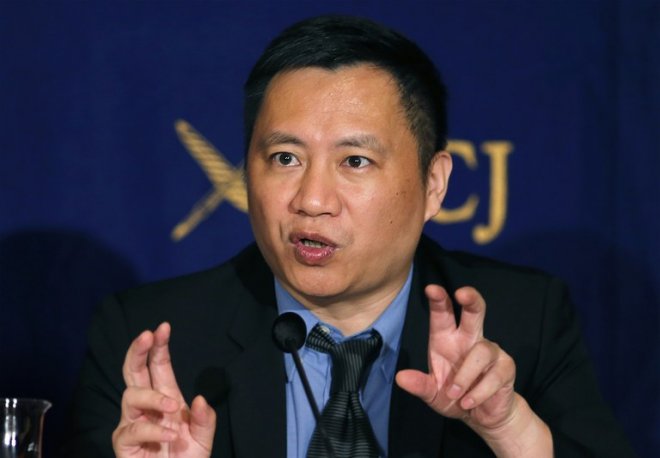 In this June 3, 2016, photo, Wang Dan, former student leader who participated in demonstrations during 1989 Tiananmen Square in Beijing speaks during a press event at Foreign Correspondents" Club of Japan in Tokyo. (Shuji Kajiyama/AP)
In this June 3, 2016, photo, Wang Dan, former student leader who participated in demonstrations during 1989 Tiananmen Square in Beijing speaks during a press event at Foreign Correspondents" Club of Japan in Tokyo. (Shuji Kajiyama/AP)"Solidarity from the whole world, including Taiwan, is very important to the safety of the protesters in China," Wang told a news conference on the protests in Taipei on Tuesday. "Taiwan, which wants to join the camp of free and democratic nations, should also express its concerns."
"It"s a concrete manifestation of resistance to the Chinese Communist Party and of the protection of Taiwan," he said, in a reference to Beijing"s threat of armed invasion to force "unification" on democratic Taiwan, which has never been ruled by the Chinese Communist Party nor formed part of the 73-year-old People"s Republic of China.
Denting Xi’s prestige?
Wang said the protests had likely already hurt Xi"s prestige within the party.
"This is just the beginning," he said, citing rising youth unemployment and an economic downturn that will fuel dissatisfaction with the Chinese government. "[Xi] definitely won"t have an easy time over the next five years, and I strongly doubt he will get a fourth term in office."
Wang also co-signed a second open letter calling on the army not to fire on civilians, should the protests spread, along with dozens of other overseas activists including U.S.-based 1979 Democracy Wall movement leader Wei Jingsheng, legal scholar and activist Teng Biao and former 1989 student leader Zhou Fengsuo, who heads the rights group Humanitarian China.
"We cannot have a repeat of the tragedy of the June 4, 1989 massacre," according to the letter, addressed to the People"s Liberation Army.
"At a time of surging protests against the brutal zero-COVID policy, we ... feel very strongly that the Chinese Communist Party, especially the dictator Xi Jinping, may mobilize all of the repressive machinery at his disposal to maintain his personal and autocratic rule," it said.
"No matter what happens ... you must never again drive tanks to Tiananmen Square like you did in 1989, let alone shoot at citizens and students in another massacre," the letter said.
It called on Chinese citizens to record any actions by the army or police leading to citizens being harmed, before echoing the first letter"s call for Xi to step down.
Support from Taiwan
Taiwanese lawmaker Hung Shen-han of the ruling Democratic Progressive Party agreed, saying the aspirations of many of Taiwan"s 23 million people were in alignment with the "white paper" protests.
"The more people see clearly the true nature of the Chinese Communist Party, how it doesn"t hesitate to crush people"s freedoms and livelihoods, the more empowered those who fight together for freedom will be," he told the news conference.
"As more and more people start to understand, we won"t need to be hostile. We can be friends, support each other, and pursue freedom and democracy [together]," Hung said.
Meanwhile, an exiled Hong Konger who gave only the nickname Sky said he empathized with the movement, although he noted that Hong Kongers" fight to preserve their traditional freedoms in 2019 had garnered scant sympathy from most residents of mainland China at the time.
"As a Hong Konger and as a human being, I support the white paper revolution, because the freedom to express one"s dissatisfaction, thoughts and ideas should be my birthright, and it"s a value that we believe in," he told the news conference.
"Maybe one day, with mutual understanding and respect, we can become partners in the pursuit of democracy," he said.
Lawyer Ho Chao-tung, who heads Taiwan"s East Turkestan Association, said the fire only came to the attention of students on Chinese university campuses after Uyghurs surrounded government offices in Urumqi to protest at the lockdown, which they said left the apartment building residents unable to escape the blaze.
The local authorities denied that the victims had been unable to leave. But there are precedents for locked doors and blocked exits leading to fire deaths in mainland China.
Translated and edited by Luisetta Mudie. Edited by Malcolm Foster.
[圖擷取自網路,如有疑問請私訊]
|
本篇 |
不想錯過? 請追蹤FB專頁! |
| 喜歡這篇嗎?快分享吧! |
相關文章
AsianNewsCast









